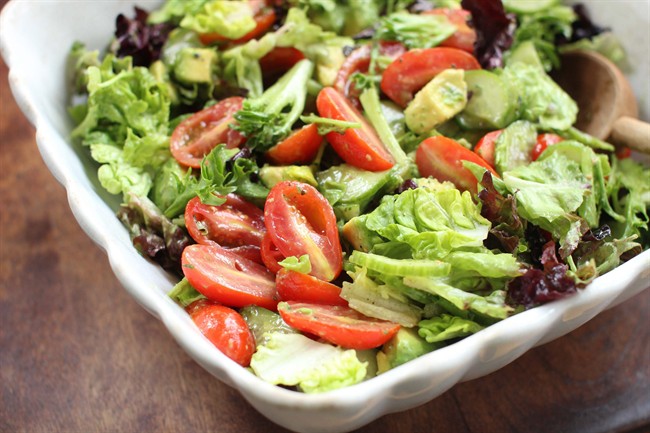Eating a salad for lunch after you’ve stayed up all night with a crying baby and faced back-to-back meetings at work? Your efforts to nourish your body by eating healthy may be fruitless if you’re having a stressful day.

In a quirky new study, scientists are warning that stress virtually cancels out the benefits you’d reap from eating a healthy meal. When anxiety gets in the way, your body responds to healthy fare like it’s a cheeseburger with fries, researchers out of Ohio State University warn.
“We’re not sure why stress negates the benefits of healthy eating. We had expected that stress might make a saturated fat meal worse, and it didn’t,” Dr. Jan Kiecolt-Glaser, the study’s lead author, told Global News.
In preliminary findings, Kiecolt-Glaser found that stress influenced how many calories people burn after eating a high-fat meal.
READ MORE: Self-control is within our reach, even when we’re tired, scientists say
This time around, she had women fast before coming in to have high-calorie, high-fat meals. A stressful morning made the difference in how their bodies reacted to what they were eating, though.
“It was the response to the meal so it really was an interaction between diet and stress. We didn’t know before this that, in fact, stress could actually hamper the effects of eating healthy,” she said.
The Ohio-based research team thinks they’re the first to show that stress erases the perks of choosing healthy meals.

Get weekly health news
For her study, Kiecolt-Glaser recruited nearly 60 women – 38 breast cancer survivors and 20 generally healthy people. They were, on average, 53 years old.
READ MORE: Fasting for weight loss? Here’s why scientists say it works long-term
Then, the women had to fast before coming into the lab for these breakfasts. There were two options, but both were high-calorie, high-fat options.
Both breakfasts had 930 calories and 60 grams of fat – nearly identical to the nutritional makeup of a Big Mac and medium fries or a Burger King Double Whooper with cheese.
The breakfast plate was loaded up with biscuits, gravy, eggs and turkey sausage – half the group’s plate was high in less-healthy saturated fat from palm oil but the others had their meals made with healthy monounsaturated fat from sunflower oil.
READ MORE: Trying to lose weight? Here’s how many calories you cut with each glass of water
“This study is what’s called the ‘meal challenge study’ where you feed people a particular meal to look at their physiological responses,” Kiecolt-Glaser explained.
The research community already knew that saturated fats can increase inflammation in the body. A diet with bad fats also boosts the production of molecules that form plaque in the arteries.
The researchers took blood samples from the women but also quizzed them on their day’s events.
Turns out, women who ate the meal prepared with bad fats saw more inflammation in “all four harmful blood markers” compared to their peers eating breakfast with healthy oils.
READ MORE: This food will make you feel fuller if you’re trying to lose weight
But a stressful day cancelled all of this out.
“In those women who had stressful days, the difference disappeared. Eating a breakfast with ‘bad fat’ was just the same as eating one with ‘good fat,’” the team warned.
Minor irritants that crop up in a day didn’t count. Stressors were examples like cleaning up paint a child spilled all over the floor or struggling to help a parent living with dementia.
“They’re not life-shattering events, but they’re not of the hangnail variety either,” Kiecolt-Glaser said.
READ MORE: Watching your weight, heart health? Cook with this oil instead of olive oil
But she doesn’t want her findings to be misconstrued: this doesn’t mean that a stressful day gives women a free pass to eat whatever they want because it doesn’t matter.
“If women want to know what they can do, eating healthy in general is a good idea, having meals that aren’t quite so heavy in terms of fat is also a good idea, and managing stress is always helpful for people and something that’s difficult for us to do,” she told Global News.
Her full findings were published Tuesday in the journal Molecular Psychiatry.
carmen.chai@globalnews.ca
Follow @Carmen_Chai


Comments